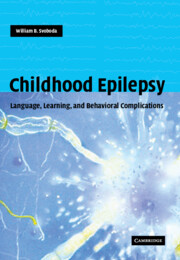Book contents
- Frontmatter
- Contents
- Preface
- Glossary
- 1 Looking ahead
- Part I Speech and language problems
- 2 Language: the challenge
- 3 Speech, language, and communication
- 4 Speech and language problems in epilepsy
- 5 Seizure types and speech and language risks
- 6 Language regression with epilepsy syndromes
- 7 Other epilepsy language syndromes
- 8 Seizure-management effects
- 9 Evaluation of speech and language problems
- 10 Management of speech and language problems in epilepsy
- 11 Behavior consequences
- Part II Learning problems
- Part III Behavior problems
- Index
- References
10 - Management of speech and language problems in epilepsy
from Part I - Speech and language problems
Published online by Cambridge University Press: 26 October 2009
- Frontmatter
- Contents
- Preface
- Glossary
- 1 Looking ahead
- Part I Speech and language problems
- 2 Language: the challenge
- 3 Speech, language, and communication
- 4 Speech and language problems in epilepsy
- 5 Seizure types and speech and language risks
- 6 Language regression with epilepsy syndromes
- 7 Other epilepsy language syndromes
- 8 Seizure-management effects
- 9 Evaluation of speech and language problems
- 10 Management of speech and language problems in epilepsy
- 11 Behavior consequences
- Part II Learning problems
- Part III Behavior problems
- Index
- References
Summary
Speech and language therapy can be divided into three types: speech therapy (usually articulation therapy), one-on-one language therapy, and language therapy as part of a team approach
The stress of speech therapy
Some children with epilepsy may find therapy stressful, possibly even triggering seizures. The tendency is for speech therapy to be canceled until the seizures can be controlled. Without the stress, the child may regain control, only for seizures to break through again when the child returns to speech therapy. In such cases, the therapist needs to know about the seizures and how to handle them. A low-key initiation with stress-helps may overcome the stress. If small seizures do occur, the therapist may let the child rest and then resume, always in a relaxed manner. A combined speech and behavioral approach works best.
Special speech and language therapy approaches
Therapy is aimed at trying to overcome identified problems. Initially, this may be individualized, one-on-one therapy with the child, but eventually it may move on to group therapy in which the therapist works with a group of children with similar problems. The next stage is to continue the therapy in the regular classroom (or a preschool program) via the teacher with the therapist serving as consultant to the teacher.
Help at home
The parent and family need to be involved in the therapy, incorporating it into their interactions at home. Hopefully, the family may be able to model proper speech as well as interact appropriately with the child in therapy.
- Type
- Chapter
- Information
- Childhood EpilepsyLanguage, Learning and Behavioural Complications, pp. 141 - 148Publisher: Cambridge University PressPrint publication year: 2004



